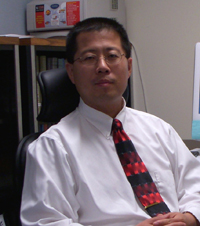 |
Dong Wang, Ph.D. |
Dong Wang, Ph.D., has novel answers for delivering medications directly to teeth, bones and joints, thanks to nanomolecular drug carriers that may have applications to many diseases.
One of the promising drug delivery systems was developed in the laboratories of Dr. Wang, associate professor of pharmaceutical science in the UNMC College of Pharmacy, and Richard Reinhardt, Ph.D., professor in the UNMC College of Dentistry. Initially, it was designed to target oral hygienics, but the technology has since been expanded for use in bone regeneration to treat osteoporosis.
On Thursday, Dr. Wang will be honored as the recipient of UNeMed’s first Emerging Inventor Award and will receive a $25,000 innovation grant for unrestricted research from UNeMed during the 2008 Innovation Awards. The campus is invited to the 4 p.m. ceremony in the Durham Research Center Auditorium. A reception will follow in the DRC Atrium.
Dr. Wang is among dozens of UNMC inventors who will be recognized Thursday for their new inventions, patents and licensed technologies.
“Dr. Wang’s research is a promising step in the search for treatment for the joint damage and pain experienced by people who have rheumatoid arthritis. In addition, his other research efforts focus on osteoporosis and are equally as promising as therapeutics,” said Sara Conrad, licensing associate, UNeMed Corporation, the marketing and licensing arm for UNMC.
|
|
“Dr. Wang is one of our most prolific inventors,” said Michael Dixon, Ph.D., vice president and chief operating officer of UNeMed. “His inventions have drawn significant interest from both the clinicians and the pharmaceutical industry. His osteoporosis and arthritis technology both have great potential to reach the clinic and improve health care.”
For oral hygienic delivery, Dr. Wang and his team developed a cyclodextrin conjugate that targets and selectively binds to teeth and bones. The agent delivered can be released slowly over time thus increasing the therapeutic index, or effectiveness, and overall performance of the agent.
“The major advantage of the invention over the traditional formulation is that it offers a very simple mechanism of drug retention in the target area,” Dr. Wang said.
In studying the new delivery system, Dr. Wang’s team also discovered that the bone-targeting cyclodextrin conjugate itself generated bone, a finding they now are exploring.
“We found that the carrier thought to be biologically inert could also, in fact, generate new bone,” he said.
The finding is significant because many of the current therapies for osteoporosis, including bisphosphonates, work by inhibiting the osteoclasts, or bone diggers that dissolve and assimilate bone, creating thinner, more fragile bones.
Rather than inhibiting the bone diggers, Dr. Wang’s system seems to stimulate the osteoblasts, or builders responsible for bone formation.
On a different venue, Dr. Wang also developed a joint-targeting delivery system for arthritis treatment. His research is supported by a three-year, $660,000 RO1 grant from the National Institutes of Arthritis and Musculoskeletal and Diseases.
With rheumatoid arthritis, people are offered drug management of their disease, Dr. Wang said.
“But, one side effect of those drugs is osteoporosis,” he said. “With our polymer carrier, the drugs will be delivered directly to the arthritic joint and provide long-lasting relief.”
As a creative thinker, Dr. Wang also wants to know how this type of drug delivery system can be used in the treatment of breast and prostate cancer that has escaped chemotherapy and taken refuge in the bone.
“With our bone-targeting polymeric delivery system, it is possible that we can stop bone damage from cancer metastasis and kill cancer cells in the bone,” Dr. Wang said. “The bone often provides a safe hiding place and a launching pad for the spread of cancer to other organs.”
It is his initial research in oral hygiene that is nearing commercialization. Already approved by the Food and Drug Administration as the drug carrier, the polymer he used to will deliver anti-microbial agents that will adhere to the tooth surface and prevent tooth decay.
“I’m shooting for a mouth rinse,” he said. “We’re now looking at different flavors. I want something that’s tasty.”
For more information on the Innovation Awards and Innovation Week events, log onto www.unemed.com.